Exam 2: Early Evolutionary Ideas and Darwin S Insight
Exam 1: An Overview of Evolutionary Biology49 Questions
Exam 2: Early Evolutionary Ideas and Darwin S Insight49 Questions
Exam 3: Natural Selection47 Questions
Exam 4: Phylogeny and Evolutionary History47 Questions
Exam 5: Inferring Phylogeny46 Questions
Exam 6: Transmission Genetics and the Sources of Genetic Variation50 Questions
Exam 7: The Genetics of Populations46 Questions
Exam 8: Evolution in Finite Populations50 Questions
Exam 9: Evolution at Multiple Loci47 Questions
Exam 10: Genome Evolution49 Questions
Exam 11: The Origin and Evolution of Early Life50 Questions
Exam 12: Major Transitions47 Questions
Exam 13: Evolution and Development45 Questions
Exam 14: Species and Speciation48 Questions
Exam 15: Extinction and Evolutionary Trends49 Questions
Exam 16: The Evolution of Sex49 Questions
Exam 17: The Evolution of Sociality50 Questions
Exam 18: Coevolution50 Questions
Exam 19: Human Evolution49 Questions
Exam 20: Evolution and Medicine50 Questions
Select questions type
Compare Charles Darwin's adaptation of Thomas Malthus' argument to plants and animals in nature (Graph A) with the figure representing Malthus' original argument (Graph B). A
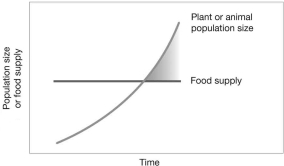 B
B
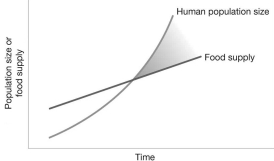
Free
(Not Answered)
This question doesn't have any answer yet
What was one of the ideas that separated Charles Darwin's On the Origin of Species as a complete, scientific explanation for evolution when compared to all other previous attempts?
Free
(Multiple Choice)
4.9/5  (26)
(26)
Correct Answer:
C
Even if philosophers accept and study the importance of biological change, a full theory of evolution by natural selection cannot exist without
Free
(Multiple Choice)
4.7/5  (34)
(34)
Correct Answer:
C
Charles Darwin's grandfather Erasmus Darwin, an English physician and philosopher, was one of the first to propose an idea of evolutionary change. What did he propose?
(Multiple Choice)
4.8/5  (33)
(33)
To explain how varieties were on the path to becoming new species, Charles Darwin introduced the concept of
(Multiple Choice)
4.9/5  (44)
(44)
Aristotle's scala naturae was a linear classification system that influenced Western thinkers for thousands of years (some would argue it still does). In this classification system, each species occupied a link in a chain that became increasingly complex. Scala naturae did not recognize the shared degrees of complexity among organisms or the ability of species and taxa to change. Which of the following is an example demonstrating that organisms have shared degrees of complexity?
(Multiple Choice)
5.0/5  (33)
(33)
Building on the ideas first proposed by James Hutton, Charles Lyell aimed to explain Earth's geological features using an approach known as uniformitarianism, which hypothesized that
(Multiple Choice)
4.8/5  (37)
(37)
Early Greek philosophers failed to exploit one of the greatest advantages of methodological naturalism, which is the ability to
(Multiple Choice)
4.9/5  (30)
(30)
Which scientist of those listed below was a contemporary of Charles Darwin and also developed a complete theory of evolution by natural selection?
(Multiple Choice)
4.8/5  (44)
(44)
Robert Chambers, a Scottish geologist and author of Vestiges of the Natural History of Creation, is often overlooked for recognizing which critical aspect of evolutionary biology?
(Multiple Choice)
4.9/5  (31)
(31)
The Greek philosopher Empedocles recognized that plant life preceded animal life. Xenophanes (570-470 B.C.) studied fossils in sedimentary rock and concluded that the rocks must have been under water at one time. Explain why these were important shifts in logical thinking.
(Essay)
4.8/5  (35)
(35)
Both Alfred Russel Wallace and Charles Darwin traveled extensively and were struck by the strong patterns they observed in the geographic distribution of nature's diversity. Which of the following observations did Wallace make?
(Multiple Choice)
4.9/5  (33)
(33)
While various religious leaders challenged almost all of Charles Darwin's major conclusions, how did the British scientific community react to his work?
(Multiple Choice)
5.0/5  (38)
(38)
In 1858 Charles Darwin received a manuscript from Alfred Russel Wallace in which Wallace proposed a theory very similar to his own. Darwin first presented his ideas in a joint paper with Wallace, which was read to the Linnaean Society, also in 1858. Why do you think history primarily associates Darwin's, not Wallace's, name with the theory of evolution?
(Essay)
4.8/5  (37)
(37)
In the figure, the hierarchically arrayed groups indicated by the shaded gray boxes are called ________ by modern evolutionary systematists. A Clusters of species
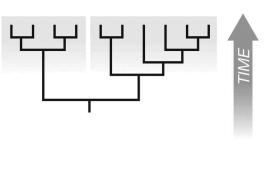 B Hierarchical patterns of similarity
B Hierarchical patterns of similarity
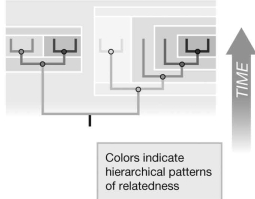
(Multiple Choice)
4.9/5  (39)
(39)
Jean-Baptiste Lamarck hypothesized that changes acquired during the lifetime of an individual organism, as a result of adapting to its environment, are passed on to progeny. Why was this incorrect but still important?
(Multiple Choice)
5.0/5  (34)
(34)
James Hutton, a Scottish geologist and naturalist, argued that the alignment of rock strata, the geological processes of erosion and sedimentation, and fossil data suggested that the world was created
(Multiple Choice)
4.8/5  (36)
(36)
Before Charles Darwin, scientists such as Jean-Baptiste Lamarck envisioned evolutionary change as transformational-properties of an ensemble change because every member of the ensemble changes. Darwin's theory of evolutionary change was, by contrast, a variational one-the properties of an ensemble change because of the action of some sorting process acting on preexisting variation within the ensemble. Referring to the figure, describe the kind of sorting process that takes place (a) when we use artificial selection to change the characteristics of a breed of animals or plants and (b) when natural selection operates on a population. 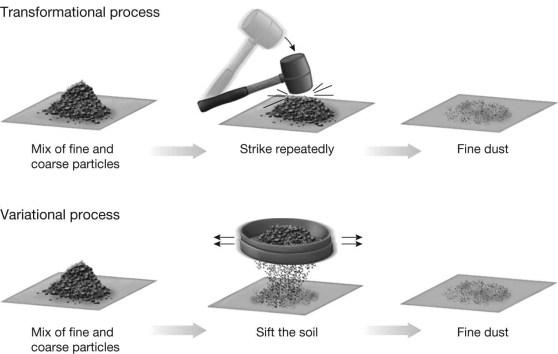
(Not Answered)
This question doesn't have any answer yet
Rather than rely on creation myths to explain the natural world, early Greek philosophers were among the first to
(Multiple Choice)
4.8/5  (29)
(29)
Showing 1 - 20 of 49
Filters
- Essay(0)
- Multiple Choice(0)
- Short Answer(0)
- True False(0)
- Matching(0)